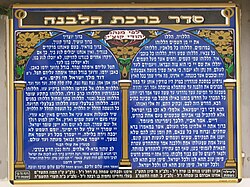Kiddush Levanah (Hebrew: קידוש לבנה, qidduš ləḇānā, Sanctification of the Moon, also known as ברכת הלבנה, blessing of the moon[1]) is a Jewish ritual performed outside at night in which a series of prayers are recited to bless God upon the appearance of the new moon.

 | |
| Halakhic texts relating to this article | |
|---|---|
| Babylonian Talmud: | Sanhedrin 41b–42a |
| Mishneh Torah: | Laws of Blessings 10:16–17 |
| Shulchan Aruch: | Orach Chaim 426 |
History
editThe source of the Kiddush Levana is in the Babylonian Talmud:
- Rabbi Yochanan taught that one who blesses the new moon, in its proper time, is regarded like one who greets the Shechinah (Divine Presence).[2]
The prayer, by its nature, is typically said outside at nighttime. Many synagogues post the text of the prayer in large type on an outside wall, for greater visibility. As such, the term "kiddush levana letters" has developed to refer to any text written in unusually large letters.[3]
Timing
editThe kiddush levana ceremony is performed on the first sighting of the new moon - performance at this time is deemed בזמנה - in its proper time, with some opining that only then is the blessing said while standing.[4] Hayyim ben Joseph Vital[5] as well the Rambam[6] adopted the view of the ceremony being done on the first night of the new moon. However, the normative custom is to wait three[7] or seven[8] complete days after the occurrence of the molad, or appearance of the new moon. The latest time for Kiddush Levanah is mid-month; while the simple reading of the Talmud[9] and the Shulchan Aruch[10] is that it can be reciting through the night of the fifteenth of the month. Nevertheless, Rabbi Moses Isserles and other rules that it can be recited only until half way through the month literally, meaning fourteen days, eighteen hours and twenty-two minutes.[10][11] There is another opinion that it can still be recited on the sixteenth of the month, as the waning of the moon is not yet recognizable.[12]
Ritual
editKiddush levana is preferably recited at the conclusion of Shabbat.[13] However, if waiting until the conclusion of the Sabbath will make it impossible to recite it before the tenth of the month, it should be recited on weekday out of fear of missing out completely.[14] The moon must be visible and not totally covered by clouds,[15] and the ceremony is preferably performed outside, as opposed to looking at the moon from a window.[16] While it is customary to say the prayer with the large crowd after the Saturday evening services, or at least with a minyan, it can be also said without a minyan and in the middle of the week.[17] In places where cloudy or rainy weather is very common, many people will recite the blessing as soon as they see the Moon for the first time after the requisite number of days.[18] In the month of Tishrei, most communities delay its recitation until after the conclusion of Yom Kippur;[19] others have a custom to say it specifically before Yom Kippur.[20] In the month of Av, it is traditionally postponed to following the fast of Tisha B'Av, as the beginning of the month is a time of mourning and the prayer should be said in a spirit of joy.[19] If a Festival falls on Sunday, Kiddush Levanah is delayed until after that day.[21] Kiddush Levanah is generally not recited on the night of a Sabbath or Festival, although if it is the last opportunity to do so one may recite it even on the Sabbath or a Festival.[22] However, in such a situation only the blessing should be recited and the additional passages should be omitted.[23]
It is customary to say additional passages in addition to the blessing; some of these are mentioned in Shulchan Aruch,[24] and others appear to have been added in the 16th century by Rabbi Yitzhak Luria.
See also
editReferences
edit- ^ The Talmud (Sanhedrin 42a) refers to "blessing the new moon", and Rabbi Yosef Karo, the author of the Shulchan Aruch consistently refers to "Birkat Ha-lavanah", "blessing of the moon". However, Rabbi Moshe Isserles in his glosses on the Shulchan Aruch intended for Ashkenazic Jews, always refers to "Kiddush Levana", "sanctifying the moon", which is the way it is referred to among Ashkenazic Jews. Sephardic and Ashknezic prayer books also refer to ritual by the two names respectively.
- ^ Sanhedrin 42a
- ^ Otiyot kiddush levana, Haaretz
- ^ Per Rabbi Moshe Feinstein's understanding of Maimonides Mishna Torah Hilchot Berachot Ch. 10 par. 17: https://www.hebrewbooks.org/pdfpager.aspx?req=916&st=&pgnum=245&hilite=
- ^ For various kabbalah reasons, see: http://hebrewbooks.org/pdfpager.aspx?req=49521&st=&pgnum=185
- ^ Mishneh Torah Hilkhot Berakhot 10:17.
- ^ Mishnah Berurah 426:20.
- ^ Shulchan Aruch OC 426:4.
- ^ Sanhedrin 41b. The Talmud says "until the sixteenth of the month", but this is understood to be until and not inclusive.
- ^ a b OC 426:3
- ^ G-D (2003-11-07). "SANCTIFICATION OF THE MOON / KIDDUSH LEVANAN". Archived from the original on 2003-12-03. Retrieved 2014-01-24.
- ^ Sheyarei Keneset Hagedolah OC 426:2.
- ^ Shulchan Aruch OC 426:2.
- ^ Rama Shulchan Aruch OC 426:2.
- ^ Shulchan Aruch OC 426:1.
- ^ Rama in Shulchan Aruch OC 426:4.
- ^ Biur Halacha 426 d.h. Ela explicitly says that it can be recited without a Minyan, and the idea to preferably recite it at the conclusion of the Sabbath is brought in the Shulchan Aruch as good practice but not essential.
- ^ Biur Halacha 426 d.h. Be-motzai Shabbat brings that some recite it in the middle of the week and don't wait until Motzai Shabbat in any case.
- ^ a b Rama in Shulchan Aruch OC 426:2.
- ^ Levush ha-chur 426:4.
- ^ Rama 426:2
- ^ Mishnah Berurah 426:7.
- ^ Aruch Hashulchan OC 426:10.
- ^ Shulchan Aruch 426:2